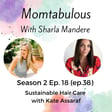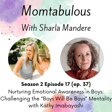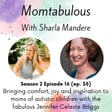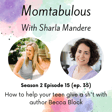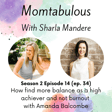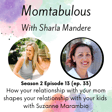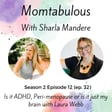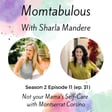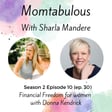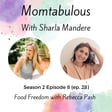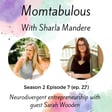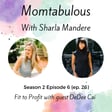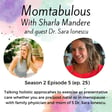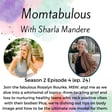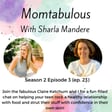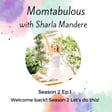Become a Creator today!Start creating today - Share your story with the world!
Start for free
00:00:00
00:00:01

IEP Madness - Continued
Continuing the important conversation about handling the IEP process without turning into the "Mad Hatter" of moms.
If you haven't listened to part 1, make sure to give it a listen as well - so much info, we packed it into two episodes for you!
Also make sure to follow Lisa on IG for loads of tips, tricks and support
@lisabaskinwright
Website: https://www.lisabaskinwright.com/
13 Doors - https://tinyurl.com/4ua2atew
Transcript
Introduction: Episode Overview
00:00:13
Speaker
Welcome back to Episode number two of IEP Madness with Lisa Baskin-Wright. We're going to pick up where we left off.
Impact of Classroom Separation on Neurodivergent Kids
00:00:22
Speaker
So you've talked a bit on social media too about like, I know a lot of the IEPs will be like, okay, we're going to take them out of class and we're going to have them work either in, in this classroom, in a smaller group, or we're going to have them work one on one with someone over here. Why?
00:00:43
Speaker
You say, you've said before, like it's not good to separate neurodivergent kids out of the classroom. And so why wouldn't that be good to do? Because maybe sometimes they do need the one-on-one support, right? And so, but maybe not for the whole day, right? So when would it be appropriate and when would it not be appropriate to separate them out of the
Intelligence Assumptions about Non-speaking Learners
00:01:10
Speaker
classroom?
00:01:10
Speaker
Yeah, no, great question. And I think it sounds like my messaging isn't very clear on social media, so I better button it up. I think what I'm really trying to say is that I question the sort of straight line when, say, for example, a non-speaking learner automatically gets segregated out and put in a self-contained classroom. And we sort of assume
00:01:34
Speaker
that because that child is non-speaking that they have a low IQ or they're not capable of learning sort of grade level content. That to me is a very unsafe assumption that most of the time are non-speaking learners. The reason why
00:01:51
Speaker
they're unable to communicate verbally is due to motor planning differences and has absolutely nothing to do with intellect. And so when we don't presume competence in higher support needs,
00:02:05
Speaker
Um, students, especially if they're like non-speaking, there just seems to be this automatic assumption, like non-speaking, not smart, which is like so false and so harmful and such a dangerous assumption to make. But what happens far too often is that we didn't take those kids and we segregate them. Same thing can happen with autistic learners, even if they have some spoken language, but they, they maybe don't have as much motoric control. So there's a lot of like stimming and movement and vocalizations or whatever that's happening.
00:02:35
Speaker
Um, or there's behavior, right? I'm using quotes again, my go-to hand signal of air quotes, where a learner is more of that fight flight response and their nervous system is getting kind of triggered all day long. So they're considered a behavior problem. So they get segregated out. I question all of that because I don't think that segregation is the answer in most situations.
00:03:03
Speaker
Having said that, if we're speaking predominantly about autistic learners,
00:03:08
Speaker
there are usually sensory processing differences.
Sensory Processing in Autism and Classroom Experience
00:03:12
Speaker
So being in a classroom with 25, 30 other students and that dynamic of all the moving parts of a Gen Ed space from a sensory perspective and other perspectives as well, but from a sensory perspective can be a lot. So it's finding that balance for each individual learner of what makes the most sense.
00:03:34
Speaker
And it also depends on age and kind of where a child is in their own sort of path towards self-determination and self-knowing, right?
Presuming Competence and Inclusive Education Decisions
00:03:45
Speaker
Like to paint with a super broad stroke, younger students tend to be kind of more willing to be pulled and leave class because the social expectation or the social norm for younger learners is different than say for a middle school child, which
00:04:04
Speaker
You know, for so many of us, our middle school experiences, I'm looking at you, but oh, good God, please don't be looking at me. Right? Like just because you're not a virgin or disabled doesn't mean that that's not your experience. So there's, there can be a different developmental periods.
00:04:20
Speaker
you know, some resistance from the child of like, I don't want to quote unquote appear different. And it just again, it totally, totally depends on the kid. My bottom line and all of this is you under all circumstances need to be presuming competence of that child. And you need to be getting really curious about who they are, how they learn, what works best for them and being open to their, their voice. And I say that meaning like their perspective, they don't have to have spoken language for us to be
00:04:49
Speaker
considerate of and very cognizant of their perspective, their voice, that that is the central, like that's your North Star. What is this experience like for this learner? And how are we making decisions with them and their perspective in mind? And so if there is a situation where that child learns best in self-contained classrooms or pulled out in one-on-one or a small group, then that's what we provide.
00:05:19
Speaker
We don't have to assign value like you're less valuable or your education's less valuable if you need higher degrees of support or like you're better if you don't. That's ridiculous. We're all human beings and we all have inherent value and our level of support needs does not determine any of that.
00:05:41
Speaker
Yeah, and what I'm hearing is it's not cookie cutter, right? So there's this, so here's where we put them. It should be, and that's I think part of the benefit of an IEP, right? I think the last thing that I want to ask is because this is something that I do here, and I know something that I felt myself too, is kind of just reframing in your head the understanding of, because when they talk about an IEP, they were constantly calling it special education.
Special Education: From Negative Bias to Supportive Plans
00:06:11
Speaker
And I grew up in the eighties, you know, we're like special education. And again, I'm doing air quotes was like a very specific thing for a very specific, you know, type of type of kid. And I think a lot of people maybe who are in my generation have this misunderstanding of what special education is now. Where it's not like you're going into a special ed classroom and it's, it, you know,
00:06:41
Speaker
that it's a place where kids can feel supported and feel like they belong to, and it's just an individualized plan to best help your child, but it doesn't mean there's anything wrong with them. So how could we look at, yeah, when they're throwing out special education left and right in this IEP process, if a parent is feeling like, oh God, you know,
00:07:08
Speaker
because we have a different understanding of what that looked like when we were in school. Right. Yeah. I mean, it's, it's, it's a, it's a bias, right? It's an internalized bias, like of ableism that we kind of have to unlearn. Yeah. So I'll admit I had to unlearn it. I'll admit 150%, you know, 150%. I, I think I had less.
00:07:34
Speaker
probably of that to do than my husband did. You know, my oldest friend in the world is dyslexic.
00:07:42
Speaker
Um, was held back when we were younger and I was like, uh, you're the smartest person I know. And you know, and my brother is, you know, definitely has learning differences and, and was marginalized in school more from a social perspective than an academic perspective. But like he was quote unquote different. Like, so I was raised around that. So my.
00:08:07
Speaker
sort of inherent belief is that everybody adds value and disability doesn't catch my attention in the same kind of way. But I also understand that we just have cultural and societal
00:08:19
Speaker
Narratives around disability, and when we say the word disabled, the hair on the back of their neck stands up, even if they don't know why, because there's this implicit bias that disabled means less. Disabled means something's wrong. And to me, it doesn't mean that at all. It's sort of value neutral. It means that there's different wiring, different neurotype, and so we're all different, and it's just sort of part of the breadth of humanity.
00:08:47
Speaker
So the other piece for those of us that are more in like, Charlotte is my age cohort is the IDEA wasn't put into law until the nineties. And so, you know, special education did look different and was defined differently when we were children because it was that self-contained segregated space. And so there was this built in systematic oppression essentially against disabled kids
00:09:17
Speaker
and othering that happened. They were separated out. And so, you know, you'll hear folks of an older generation, you know, say things that to those of us that, you know, are a little further along in our learning journey, find deeply offensive, but it's like, well, back in the day, yes, you did. We just segregated them out so you didn't have to look at it. And that's not okay. We are not meeting those people
00:09:45
Speaker
where they were at, we were not treating them as the full humans that they are. There's so much there that's
Understanding the Continuum of Special Education Placements
00:09:50
Speaker
wrong. That's some of what when we're talking about not separating kids that need some support, if they can stay in the classroom, not separating them out of the classroom, because just like anything, the more exposure, the more access, the better our understanding, the more compassionate we are, just everything, right?
00:10:10
Speaker
I think that that's speaking to some of that, like keeping neurodivergent kids in the classroom as much as possible if it works for them, because then they don't have that bias that a lot of us. Right, because we're all who we are, right? So if you have a young person, say in a kinder class, and for them to learn and be engaged and process information, they need to be moving or humming or have a fidget in their hand, or maybe they don't communicate with verbal speech or whatever.
00:10:40
Speaker
But they're just part of the classroom community. It's very easy at that age to be like, yeah, Lisa, you know, he communicates with her AC device, and you communicate with your mouth words. And like, that's just how we are. And then it just is like, Oh, yeah, that's how Lisa communicates. And then we teach everybody else how to communicate via
00:10:59
Speaker
Sign language or AAC or whatever it is the way Lisa does and we include Lisa because she's a part of our community and it is what it is, right? Like something that's maybe less obvious, you know of just like Lisa needs to move around a little bit because she learns best when she's moving a little bit and you know, or Lisa's having a big emotional, you know, outburst in class like, gosh, we all have big feelings sometimes, huh?
00:11:22
Speaker
Yeah, show kindness and then we show kindness to you when you're having those big feelings like we take it and we sort of globalize difference as just part of the human human experience. But I agree with you that that piece but but to answer kind of the difference between special education, sort of then versus now, there's something called the full continuum of placements within special education. And it goes all the way from general education with
00:11:50
Speaker
essentially no supports, all the way up through like a residential treatment program or home-based instruction and everything in between. So I definitely will have families coming to me that were part of like our generation or older and they think, I don't want my child separated into this, you know, segregated space when all they need is a little support in reading or writing or whatever it may be. And I have to reassure them that's not even
00:12:20
Speaker
part of the continuum that we would be considering because that's not the support level that they need.
ADHD Diagnosis in Adults and Personal Experiences
00:12:27
Speaker
Yeah. And is, you know, I also think it's quite possible that, you know, I'm speaking just for myself here, there's a large amount of adults in our generation that probably would have been diagnosed with something, some kind of learning difference. But, you know, like I know for a fact, I have undiagnosed ADHD.
00:12:49
Speaker
Like I was that kid bouncing in my seat, could not sit still. When we had read out loud in class, I was daydreaming and the teacher would be like, it's your turn. And I was three pages behind everybody else. Cause I just could not focus, but they didn't diagnose girls in the eighties with that. That was new. And it was like, oh, this boy in your class was just diagnosed with ADHD, you know? And it was this whole line and like my mom would whisper it like,
00:13:17
Speaker
like, where are we whispering it? What's wrong? You know, and oh my gosh, but he was still in the class. And yeah, that makes sense because he's hyper AF, but so was I. You know, and I felt like there's probably a lot of like, I for sure, I know the meetings that my parents had with the principals and the teachers were essentially giving me a 504, what now is called a 504.
00:13:43
Speaker
in the 80s was just, you know, she just needs some help focusing. She just needs, she just needs, you know, to do this. And so some of it was the teacher would do certain things. And, but I did always feel kind of singled out because none of my friends were getting that. So it was never explained to me why this was happening. You know, absolutely. I think it is such commonplace for moms in particular, because women even now,
00:14:11
Speaker
We don't, especially for like lower support needs or higher masking individuals like women just tend to get overlooked in the diagnostic process. It is so unbelievably common for parents moms in particular.
00:14:29
Speaker
to get diagnosed, either autistic ADHD or both, when their child does. Because as they're going through the evaluation process for their child, they're remembering back their own childhood and thinking, gosh, these questions that you're asking sound awfully familiar to me. And so then you've got, you know, mid 30s, 40s, even 50 year olds figuring out
00:14:53
Speaker
Oh, that's right. Like, I had that experience recently, I have a very small team that helps me with like the tech side of, of my business, because that's just not my area of strength. And in the second meeting, they're both neurodivergent. In the second meeting, one of them said to me, do you consider yourself neurodivergent? And I said, well, I'm definitely dyslexic. But and then I sort of stopped mid sentence and looked at her and I say, you think I have ADHD, don't you? And she's like a little bit.
00:15:19
Speaker
And the second I said something to my daughter, like, she was like, Oh, my gosh, you 1000% do and it's like, I can see it more and more in myself. Like, it's I absolutely have ADHD. Yeah. And it's a good thing to know. Like, again, I just turned 50 the other day. And it's like, I'm so excited that I now have this understanding of myself. And it makes sense why
00:15:44
Speaker
certain things in school work hard for me, but it also makes sense. Like I asked Anna, my team member, why she asked me the question. And her response was, because you have such a strong sense of social justice and passion for equity and equality, and that is a neurodivergent trait. And I was like, oh my gosh. And it is. It is a neurodivergent trait. That doesn't mean that neurotypical people can't
00:16:14
Speaker
be social justice warriors, but it is a neurodivergent trait to really feel like we need to center everyone's humanity and that we all have value. That is more common in the neurodivergent community, I think, from my very narrow perspective. Yeah.
00:16:35
Speaker
No. And that's awesome, right? And yeah, I do see like, you know, I follow Shaleen Johnson on social media and she talks a lot about ADHD and adult and women running businesses and
Organizational Habits in Individuals with ADHD
00:16:46
Speaker
ADHD. And she's a big, you know, advocate for that. And I watch her and listen to her podcast on it too. And it's really interesting because that was where I was like, Oh yeah. And one thing that she was talking about in one episode was piles.
00:17:01
Speaker
Like, and I remember I all, I still, I have a pile of papers over here that you can't see on the camera, but it, I have piles of things and I could tell you exactly what is in that pile. I could tell you where the paper is that I'm looking for. And my mom would be like, pick these piles up, these piles of just, and I was like, no, no, no, no, no. Those are organized.
00:17:23
Speaker
She would be like, this is piles of junk. And I go, no, no, no, that's my homework. This is papers for these are pictures for my friends. This is this, this is that like, I knew exactly this is laundry that needs to be put away. This is laundry that's dirty. This is I knew exactly what was in my piles. It would drive my mom crazy. But for me, that was organized. And that's it. I learned through listening to Shaleen Johnson, that's a classic ADHD trait. And I was like,
00:17:50
Speaker
I still do it and my piles don't bother me, but if I see your pile, look out. Your pile will drive me crazy. I've never heard that. No, what's in your pile?
00:18:02
Speaker
Right, exactly. Your pile is very disconcerting to me. Yes, no, it's hilarious to say that because Aaron and I have an ongoing, I'll call it argument, it really isn't. But I have one, two, three, four, five piles. We're not counting what's behind me over here. Just on my desk, I am the queen of like index cards. And they all each stack of index cards is different stuff. And he's like, clean it off. And I'm like, I can't. And if you touch it, I might have to kill you.
00:18:32
Speaker
Yeah, when I worked in a corporate call center and I had post-it notes all along my like monitor my computer of like reminder to respond to this email, reminder to call this person back, reminder to eat lunch. My post-it people will be like, you have so many post-its. And I was like, I know, but they're pretty because it's like a rainbow. They're all, I use different colors for things, but also
00:19:00
Speaker
I'll forget and they just set set a reminder in your you know to go off in your note that timer doesn't work for me a reminder my phone does not work for me I have to write it down and see it and put it somewhere and then I will remember now I can do reminders in my phone it goes off but I will delay that reminder.
00:19:22
Speaker
didn't come at a good time. That's hysterical. Well, I do exactly the same thing and I have an index card pile for to do. Yeah. So you're a mom and your kid has piles everywhere. Right. What's going on? And they tell you it's organized and they know exactly what's in it. Just my oldest is like that. And I'm like, clean this up. And she's like, no, no, no, no, I know what's there. And I'm like, Oh God, you're me.
00:19:47
Speaker
Shoot. Okay. Great. Sorry. I passed that on. Sorry. Yeah, we have that in this house a lot. I'm like, oh, I see me and you a lot. You're welcome. Okay, Lisa, this has been so good, so much good information. I feel like we could have probably four or five episodes on this, but I know we've only scratched the surface and you're so knowledgeable.
Lisa's Journey and Resources
00:20:13
Speaker
So for people that want to
00:20:15
Speaker
follow you. So Instagram is Lisa Baskin-Wright, and it's W-R-I-G-H-T. And your website, www.LisaBaskinWright.com, I'll link that below. But if you want to learn more about Lisa's personal journey, navigating special education for their daughter, her husband, Erin, actually, I love this, he chronicled the whole experience and put it into what is now an award winning book called 13 Doors.
00:20:45
Speaker
And I've read the book, it's awesome. I have the book. I've known Lee Sipper a few years and I love that Aaron, you didn't even know he was taking notes. You were just like, you did what? No, I didn't. He had been working on the book for four years and he handed me a flash drive and I didn't know what it was. And he's like, just a couple of thoughts I had. And so I, you know, put it in the laptop to open it. And again, dyslexia here at play, at the time it was all these separate files.
00:21:15
Speaker
and I skipped the first one and so I opened the second one so I missed the cover page. And so I'm reading this thing and I don't understand, this chapter didn't make it into the book, but it was like,
00:21:27
Speaker
reflection of his childhood and it's like this story in a hardware store with it and I'm thinking what the heck is this and then I go to the next file and all of a sudden I realize it's a book because he wrote it like a novel so it reads like fiction except it's not and so Julia my daughter was in the room and I looked at her and I said oh my gosh did daddy write a book and she started giggling and I went oh my gosh four years and then of course I called him and said um sir what else are you keeping
00:21:58
Speaker
I can hold on to a thought for four seconds before I have to talk about it, right? No, four years.
Aaron's Book on Special Education Journey
00:22:05
Speaker
But he is very different and he needed to process it and he didn't write it as retribution. In many ways he wrote it as catharsis, but what he really discovered, and unfortunately this is just so true, is that our experience wasn't unique.
00:22:20
Speaker
And that the system is flawed well beyond the small town we were living in. And that there are thousands and thousands of families experiencing a similar journey. And it was just the feedback he got was so remarkable from families who have engaged in the special education process of like, I don't know how this man was in my living room, like watching my life, but I've never read anything that felt more resonant.
00:22:51
Speaker
Yeah. And it's an important book. And I love, you know, my hope with this podcast is moms feel seen and heard. And with his book, you know, people going through this process can feel, at least feel seen, right? Feel like, okay, in a way, this is not necessarily a process that you want to hear like, okay, I'm not the only one. Other people are experiencing this too, because it means the system is broken.
Support for Families in Special Education
00:23:18
Speaker
It is very broken.
00:23:20
Speaker
But at the same token, it's nice to know you're not the only one, you know, and to feel like, okay, and the hope of
00:23:32
Speaker
you made it through the other side and you've turned it into something where you can help people. And I'm hoping to take, you know, what Sorella will allow me to tell of her story and help others and at least share my point of view to help other moms. And that was honestly part of what sparked this podcast was like, I'm better talking about things. I am writing a book, but it's taking me forever. So I hope it doesn't take four years.
00:24:00
Speaker
on my way. But to help other people, other moms, to feel not alone, to feel heard, to feel seen, and to have that hope that there is a light at the end of the tunnel and that we can get through it and get through it fabulously.
00:24:20
Speaker
but get through it, period. Just getting through is fabulous. And then doing what's right for your child and your family. Like I said, we ended up pulling, we're fully homeschooling right now, but through a charter that has a hybrid option and eventually hoping she'll return to the classroom. And, but maybe that's not, maybe people pull and go to a private school or pull and just homeschool in their own, that's a whole separate thing.
00:24:46
Speaker
or stay and work it out with the school and figure it out and advocate. And it's helpful to have someone on your side. So follow Lisa's Instagram for lots of tips and tricks.
Advocacy and Support Services Offered by Lisa
00:24:59
Speaker
And you do help people and go in via Zoom and show up in those meetings and advocate. And man, I wish I would have...
00:25:10
Speaker
Maybe things would be different hindsight 2020. However, right as of right now, my kid emotionally is thriving. So that is what it's important. And Lisa, thank you so much for being here and we will see you in the next episode.
